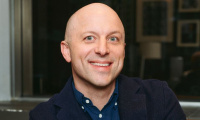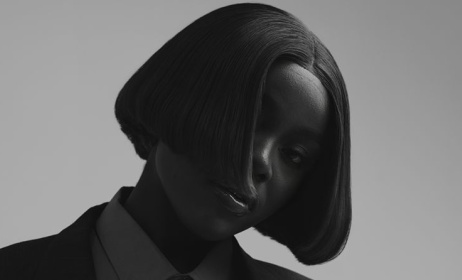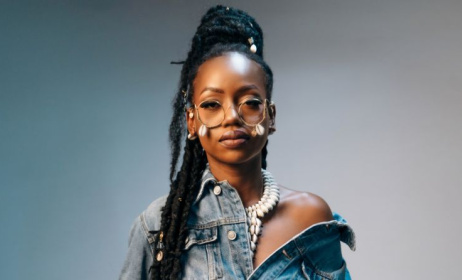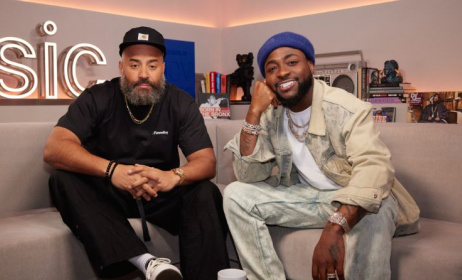How MI Abaga made two albums in one year
The last time I interviewed MI Abaga, the night ended in a fugue of alcohol and fried chicken. When we meet for the first time this year, both of us are sober—or so it seems.
 MI Abaga released Rendezvous and Young Denzel in 2018. Photo: Chocolate City
MI Abaga released Rendezvous and Young Denzel in 2018. Photo: Chocolate City
Back then, he was weeks away from releasing his last studio album, The Chairman, and was tinkering excitedly in the studio. All of these years later, he hasn’t quite changed. He looks just as boisterous after pretty much flying out of the back seat of a jeep when he arrives for our first interview.
I've caught him between projects: Rendezvous has been released; a second album, the much anticipated Yung Denzel, is in the future. But I am curious about another project, The Love EP, which I know about because, last year, he performed its songs at a Lagos Island concert.
“Fans haven’t heard from me in a while, so let me first give them more hip-hop,” he says. “Rendezvous will make it easier for people to expect the Love EP. I thought I would spend a lot of time explaining what The Love EP was.”
What it was from my memory of that night was a series of songs tracking the start and demise of a relationship. If ‘One Naira’ from MI2 was about a love affair itself, The Love EP is a collection of songs about the first flushes of love and its last goodbyes. MI tells me, “It was a very specific project, very personal, there is no single on it, no real rap songs."
The idea behind that EP has changed. “It will now morph into a series like Illegal Music [a much-beloved trio of mixtapes]. The first one is called A Study of Self; the second one is called A Study of Love.” The first one the subtitle to what fans know as Yung Denzel. The second in the series has no release date but is likely to have the songs from the Love EP.
If it all seems a bit overdressed, then welcome to MI’s world. The rapper famously structured his second album MI2 as a movie, adapting New Line Cinema's sound to open the album and closing with a dozing viewer; his third album The Chairman had one song and its opposite title, its odd number of songs leaving one unpaired song, which he titled 'The Middle'. (It is hard to understand without looking at the album’s back cover.) Rendezvous more or less tells the story of one guy and his crew’s night out in Lagos. And Yung Denzel is woven around a conversation with a therapist. As he himself might say, if it is complicated, it must have been done by another MI.
Rendezvous comes with an added complication: MI calls it a playlist, a clear nod to Drake’s More Life from 2017—but if MI’s studio albums are public statements and his mixtapes are personal ones, what is the playlist?
“I don’t know,” he sighs. “I am hoping that when I am done making music, people can just look at it as a body of work. It is like with The Love EP. It is music; I think it is great music but it is just a thing. Rendezvous, I guess, is a transition into a more experimentally playful MI. I was chasing a vibe but I wasn’t sure who I wanted to feature. What I did was I had a group of them [the featured artists] come and hang out in the studio.” He spoke to a few people—Mr Eazi, Burna Boy—but the collaborations never happened. “I was listening to the wavy movement, the SoundCloud group, and asking, ‘what are you guys into, why is that dope’?”
The songs he recorded at this point were to be on Yung Denzel. But that changed. The songs became “more experimental”, more unlike MI. He decided it would be a different project, while Yung Denzel retained a “very deep, very introspective" vibe.
Strangely, the title itself began as a joke. For some reason, MI decided to call himself Young Denzel, a reference to American actor Denzel Washington. The reaction was harsh: You don’t look like him. “So it is sort of like a satire on this almost foolhardy confidence in yourself that one must have to succeed at anything. I am a guy in Jos but I want to be the biggest rapper in Africa. Or I’m a guy from Bariga and I want to perform one day with Wale. It is almost insane. So that’s like me saying I remind myself of young Denzel and people say, ‘Are you crazy’?”
“I thought it was going to be fun,” he adds, “but I was dealing with a lot of things at the time. I was just named CEO and the media was lambasting me. Everything that is wrong with Chocolate City is my fault. Everybody that is leaving is MI’s personal fault.”
But it wasn’t just the regular media. MI tweeted that he was better than the American rapper Pusha T, a statement that was badly received online. The response sparked an inner dialogue as he considered the meaning of self-esteem. Young Denzel is the product of that self-examination. On a song with the rather motivation-speak title, ‘I Believe In You, You should too, Believe in You’, he directly addresses the incident without backing down. “I don’t know Pusha T,” he raps, “but if he ever heard about me then he should be honoured to be mentioned in the same breath as an African myth, a legend, living king of the mic—now shouldn’t he?” (The answer he expects to hear is clear.)
MI switched the order of release: What he recorded first was released last: Or, as he tells me: “Rendezvous is basically leftovers from the Yung Denzel project.” The former album came together haphazardly. A Wande Coal chorus was recorded in 2013. SoundCloud-famous producers like Odunsi and GMK were introduced to MI in February last year.
This choice of artist-partners means Rendezvous is a departure from The Chairman, an album that featured the famous trio of local rappers: Olamide, Reminisce and Phyno. Many fans saw this as a betrayal since MI is supposed to be Nigerian hip-hop's most popular avatar for English rap, but accusations of treachery are nothing new to the man.
“As Nigerians were discovering me, my core fans in Jos were saying, ‘MI sold out’. As long as you start rapping people put you in a box, so I said let me make an album that would break that box. I wanted to make caller-back music, the kind of music that your father would say ‘I love this song’, but it is a rap song.”
Rap purists frowned but that principle led to MI2, MI’s most popular album. As we speak, he looks unhappy with those reactions but maintains that his choices were necessary. “The tyranny for me has always been somebody saying I can’t do this. So when they say I can’t make it without speaking vernacular, I say I don’t agree with that. When they say I am an English rapper and can’t now speak vernacular, I say I don’t agree with that. When they say a rapper can’t succeed without singing, I say I don’t agree with that.
“I am always against the guy that says you can’t do that. Maybe I haven’t explained this properly so people see some kind of hypocrisy. But it is human to contradict yourself from time to time. I love Mode 9’s catalogue and I also love Olamide’s catalogue, and I think they are both as important as each other.”
But neither rapper is on Rendezvous or Yung Denzel. He has gone with the Soundcloud group and several radio and social media personalities. I ask if the media guys were included to get social media buzz upon release. No, says MI. “Whatever is contrived will never make it to an MI project.” How about the skits interfering with the music? He says, the aim is to deliver an experience to his fans.
For Rendezvous, the concept, as he lays it out, was to have each radio person, except one, fit in with the regular schedule they have in real life—if you were listening to Lagos radio on a Friday night out. The social media guys were paired with songs that seemed to fit their personality. “If I was the kind of person that wanted sensationalism, I will be different,” he says.
Some have argued that the climate is itself different, that it is no longer possible for English rap in any guise to be successful. In fact, with the benefit of hindsight, MI is a unicorn. Before his time, English rap in Nigeria was hardly commercial. And outside of his circle and the peak of his popularity, the form has hardly been money-spinning. But because he enjoyed so much attention in the past, many listeners have equated the decline in Nigerian rap's popularity with a decline in MI's rap skills.
Naturally, he doesn’t agree but the situation is addressed in one exchange with the therapist on Yung Denzel, which was released in August. He tells her he meets people who claim he was “really good before”. The therapist, a South African named Caryn Solomon, explains the situation as a kind of patricide, but I wonder if it was difficult to include that stretch of dialogue on the album. The apparent vulnerability, after all, can be interpreted as a sort of capitulation.
"That was not my intention at all," he says when we meet a second time this year. "It is the power of interpretation and people are going to interpret it the way they can. People see a star and the person as one and completely bind the two together. I am not MI. MI is a job, something I do. I am Jude. I am a brother and a father figure to some, I'm a son, I am an employee, I am an employer.
"When somebody makes a comment about my performance at work the context doesn't really define me as a person because I see myself outside of MI. My point of saying that to Caryn was to say that people are wrong." He met in his capacity as Chocolate City's CEO at a leadership fellowship. She had 20 minutes with each participant; MI recorded his and asked for another session. He got it.
I ask if he would do therapy in Nigeria and he says yes, he thinks everybody needs therapy. If only because of "the high profile nature of the job: you successes are muted and your failures are exaggerated. If somebody left Chocolate City I'll be answering that question for a year. If I won an award, it will be over in a week. When people look at 2face, they'll say he's a legendary guy but if you should go and sit with 2face, and ask 'how is your experience of that legendary journey being, he'll be like: 'When I mess up they kill me; when I do something, they'll be like: good job.'" He offers the last two words with a shrug.
I quote a line from his 2016 single 'Everything' to make a point about his frequent allusions to his legacy. He assumes a thoughtful pose and then says: "When you are a younger rapper, the enemy is people that don't believe in you. When you become the top guy, the enemy is people competing with you, at a certain point when those guys are no longer enemies, the enemy becomes the history books."
He goes further and says it is normal for rappers who have had a similar career arc to his has tried to remind listeners of how great they have been. "That's what them Jay-Z and Eminem talk about at certain points. Eminem's whole catalogue over the last ten years has been about that." When I offer an objection on Jay-Z, he produces his phone and goes through the rapper's tracklist from his last few albums, offering his take on a variety of tracks. It turns out that he might be right that every rapper dominant at some point is obsessed with reminding whoever is listening of his greatness.
Much later, I watch MI watch a music channel when Olamide comes on singing 'Motigbana'. He looks so positively riveted that I recall he once told me Olamide had a chance to be the greatest rapper in Nigeria because he raps in Yoruba, one of Nigerian pop's major languages. I ask what he thinks now, given how often he is pitted against the younger rapper in rap conversations online and offline.
"If you knew how much of a fan of Olamide I am, you wouldn't ask that," he says. Point taken.
Olamide has of course taken the hit single route several times, but over the past few years, MI has made albums without clear radio-friendly singles. What has happened to his own commercial aspirations?
He says he obeys different impulses at different times, and even if he knows that "making Yung Denzel and making Rendezvous is not the thing to do in a singles market where everybody has a single beat, that pon pon sound," he believes he can make music the way he wants and still be accepted by listeners.
"The worst thing that can happen to an artist is to compromise on your inspiration and still don't get validation from the world," he says. "And MI will never compromise on his inspiration."




























Comments
Log in or register to post comments